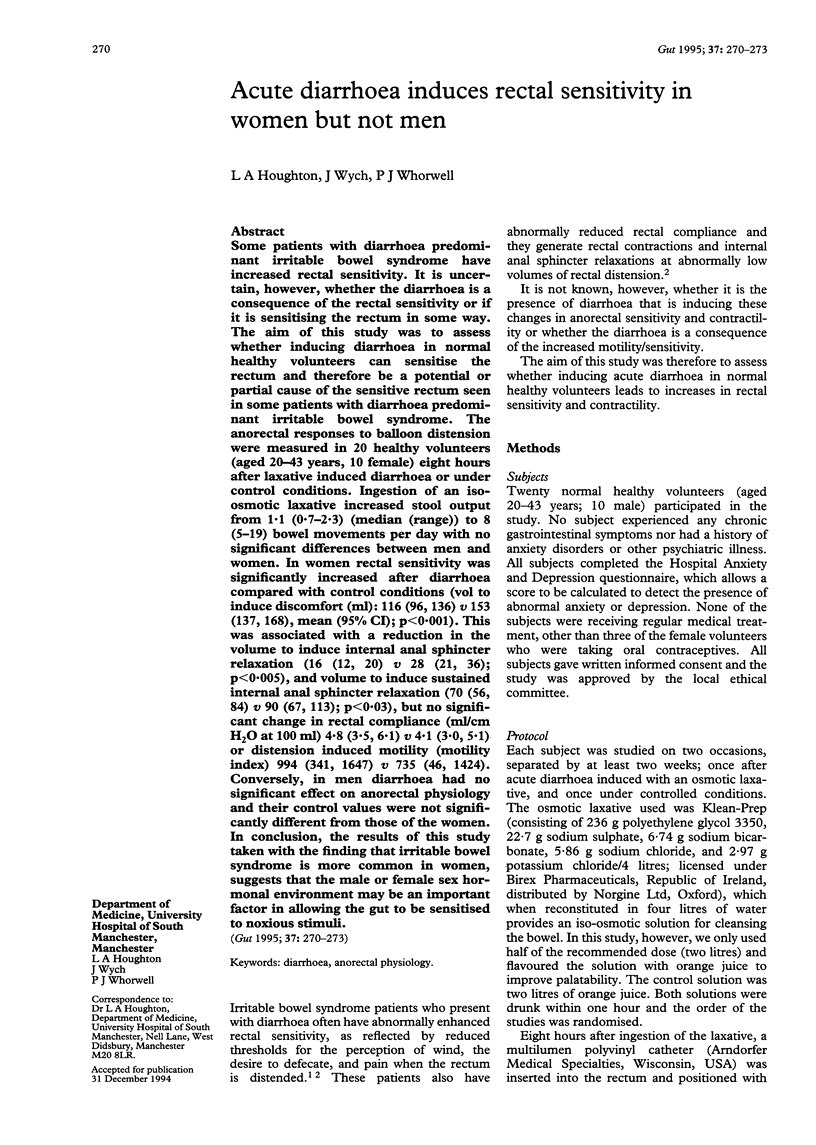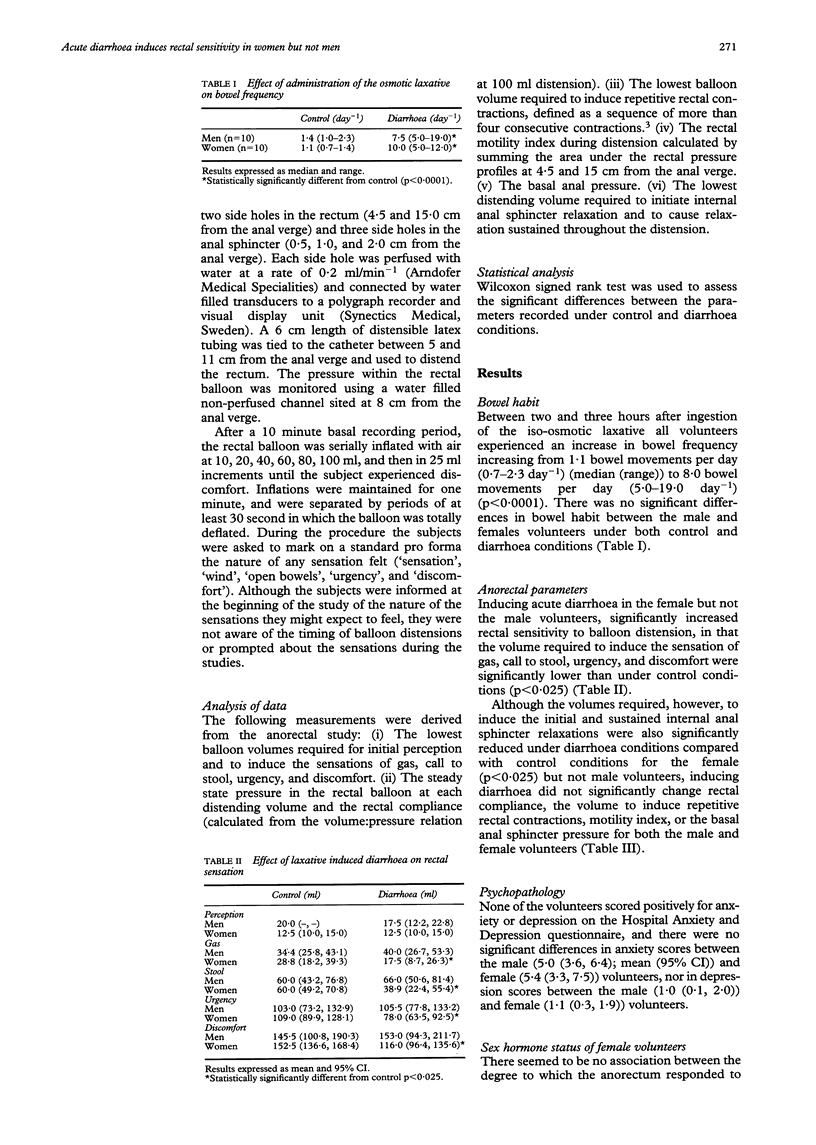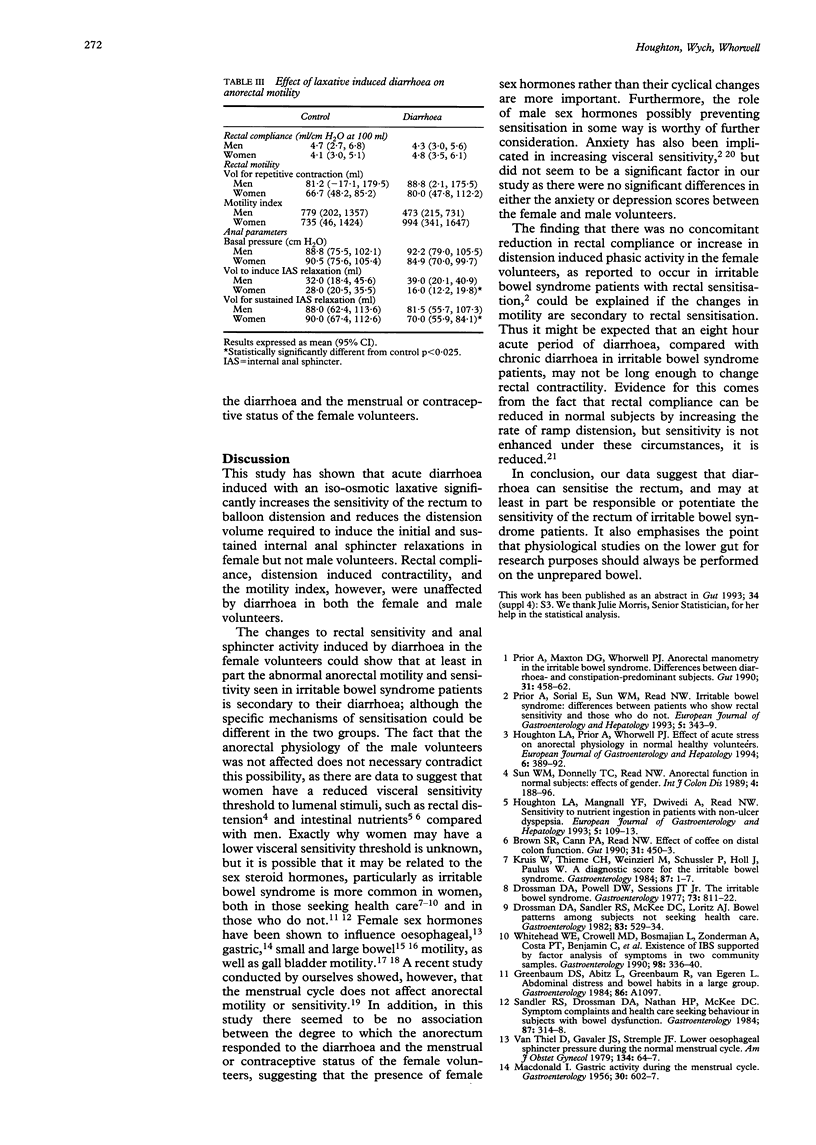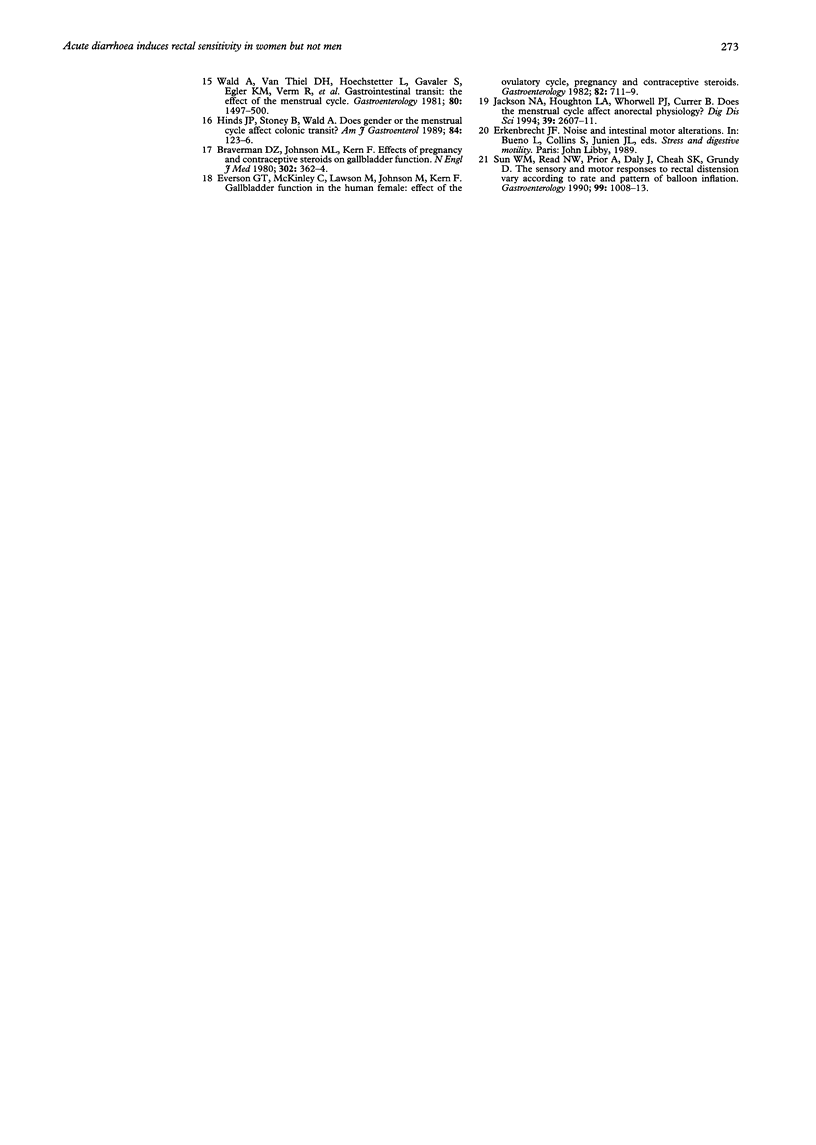Abstract
Some patients with diarrhoea predominant irritable bowel syndrome have increased rectal sensitivity. It is uncertain, however, whether the diarrhoea is a consequence of the rectal sensitivity or if it is sensitising the rectum in some way. The aim of this study was to assess whether inducing diarrhoea in normal healthy volunteers can sensitise the rectum and therefore be a potential or partial cause of the sensitive rectum seen in some patients with diarrhoea predominant irritable bowel syndrome. The anorectal responses to balloon distension were measured in 20 healthy volunteers (aged 20-43 years, 10 female) eight hours after laxative induced diarrhoea or under control conditions. Ingestion of an isoosmotic laxative increased stool output from 1.1 (0.7-2.3) (median (range)) to 8 (5-19) bowel movements per day with no significant differences between men and women. In women rectal sensitivity was significantly increased after diarrhoea compared with control conditions (vol to induce discomfort (ml): 116 (96, 136) v 153 (137, 168), mean (95% CI); p < 0.001). This was associated with a reduction in the volume to induce internal anal sphincter relaxation (16 (12, 20) v 28 (21, 36); p < 0.005), and volume to induce sustained internal anal sphincter relaxation (70 (56, 84) v 90 (67, 113); p < 0.03), but no significant change in rectal compliance (ml/cm H2O at 100 ml) 4.8 (3.5, 6.1) v 4.1 (3.0, 5.1) or distension induced motility (motility index) 994 (341, 1647) v 735 (46, 1424). Conversely, in men diarrhoea had no significant effect on anorectal physiology and their control values were not significantly different from those of the women. In conclusion, the results of this study taken with the finding that irritable bowel syndrome is more common in women, suggests that the male or female sex hormonal environment may be an important factor in allowing the gut to be sensitised to noxious stimuli.
Full text
PDF



Selected References
These references are in PubMed. This may not be the complete list of references from this article.
- Braverman D. Z., Johnson M. L., Kern F., Jr Effects of pregnancy and contraceptive steroids on gallbladder function. N Engl J Med. 1980 Feb 14;302(7):362–364. doi: 10.1056/NEJM198002143020702. [DOI] [PubMed] [Google Scholar]
- Brown S. R., Cann P. A., Read N. W. Effect of coffee on distal colon function. Gut. 1990 Apr;31(4):450–453. doi: 10.1136/gut.31.4.450. [DOI] [PMC free article] [PubMed] [Google Scholar]
- Drossman D. A., Powell D. W., Sessions J. T., Jr The irritable bowel syndrome. Gastroenterology. 1977 Oct;73(4 Pt 1):811–822. [PubMed] [Google Scholar]
- Drossman D. A., Sandler R. S., McKee D. C., Lovitz A. J. Bowel patterns among subjects not seeking health care. Use of a questionnaire to identify a population with bowel dysfunction. Gastroenterology. 1982 Sep;83(3):529–534. [PubMed] [Google Scholar]
- Everson G. T., McKinley C., Lawson M., Johnson M., Kern F., Jr Gallbladder function in the human female: effect of the ovulatory cycle, pregnancy, and contraceptive steroids. Gastroenterology. 1982 Apr;82(4):711–719. [PubMed] [Google Scholar]
- Hinds J. P., Stoney B., Wald A. Does gender or the menstrual cycle affect colonic transit? Am J Gastroenterol. 1989 Feb;84(2):123–126. [PubMed] [Google Scholar]
- Jackson N. A., Houghton L. A., Whorwell P. J., Currer B. Does the menstrual cycle affect anorectal physiology? Dig Dis Sci. 1994 Dec;39(12):2607–2611. doi: 10.1007/BF02087697. [DOI] [PubMed] [Google Scholar]
- Kruis W., Thieme C., Weinzierl M., Schüssler P., Holl J., Paulus W. A diagnostic score for the irritable bowel syndrome. Its value in the exclusion of organic disease. Gastroenterology. 1984 Jul;87(1):1–7. [PubMed] [Google Scholar]
- MACDONALD I. Gastric activity during the menstrual cycle. Gastroenterology. 1956 Apr;30(4):602–607. [PubMed] [Google Scholar]
- Prior A., Maxton D. G., Whorwell P. J. Anorectal manometry in irritable bowel syndrome: differences between diarrhoea and constipation predominant subjects. Gut. 1990 Apr;31(4):458–462. doi: 10.1136/gut.31.4.458. [DOI] [PMC free article] [PubMed] [Google Scholar]
- Sandler R. S., Drossman D. A., Nathan H. P., McKee D. C. Symptom complaints and health care seeking behavior in subjects with bowel dysfunction. Gastroenterology. 1984 Aug;87(2):314–318. [PubMed] [Google Scholar]
- Sun W. M., Read N. W. Anorectal function in normal human subjects: effect of gender. Int J Colorectal Dis. 1989 Aug;4(3):188–196. doi: 10.1007/BF01649702. [DOI] [PubMed] [Google Scholar]
- Sun W. M., Read N. W., Prior A., Daly J. A., Cheah S. K., Grundy D. Sensory and motor responses to rectal distention vary according to rate and pattern of balloon inflation. Gastroenterology. 1990 Oct;99(4):1008–1015. doi: 10.1016/0016-5085(90)90620-g. [DOI] [PubMed] [Google Scholar]
- Van Thiel D. H., Gavaler J. S., Stremple J. F. Lower esophageal sphincter pressure during the normal menstrual cycle. Am J Obstet Gynecol. 1979 May 1;134(1):64–67. doi: 10.1016/0002-9378(79)90797-x. [DOI] [PubMed] [Google Scholar]
- Wald A., Van Thiel D. H., Hoechstetter L., Gavaler J. S., Egler K. M., Verm R., Scott L., Lester R. Gastrointestinal transit: the effect of the menstrual cycle. Gastroenterology. 1981 Jun;80(6):1497–1500. [PubMed] [Google Scholar]
- Whitehead W. E., Crowell M. D., Bosmajian L., Zonderman A., Costa P. T., Jr, Benjamin C., Robinson J. C., Heller B. R., Schuster M. M. Existence of irritable bowel syndrome supported by factor analysis of symptoms in two community samples. Gastroenterology. 1990 Feb;98(2):336–340. doi: 10.1016/0016-5085(90)90822-i. [DOI] [PubMed] [Google Scholar]


